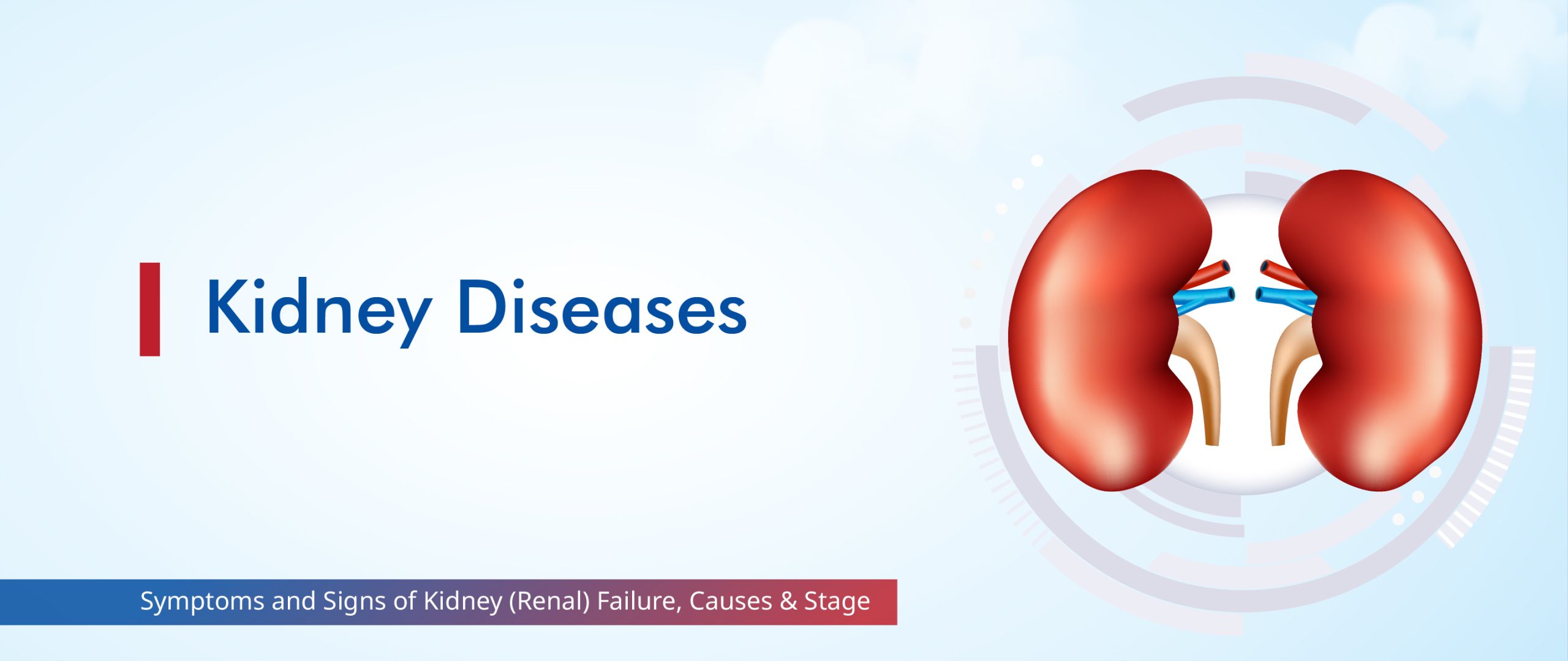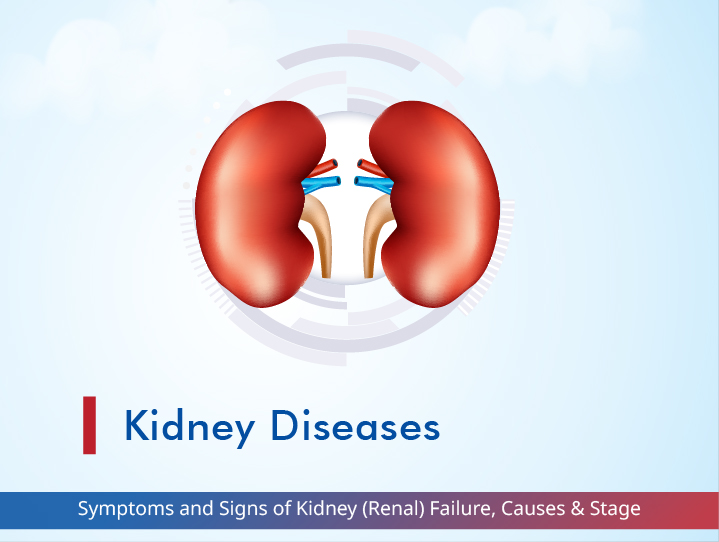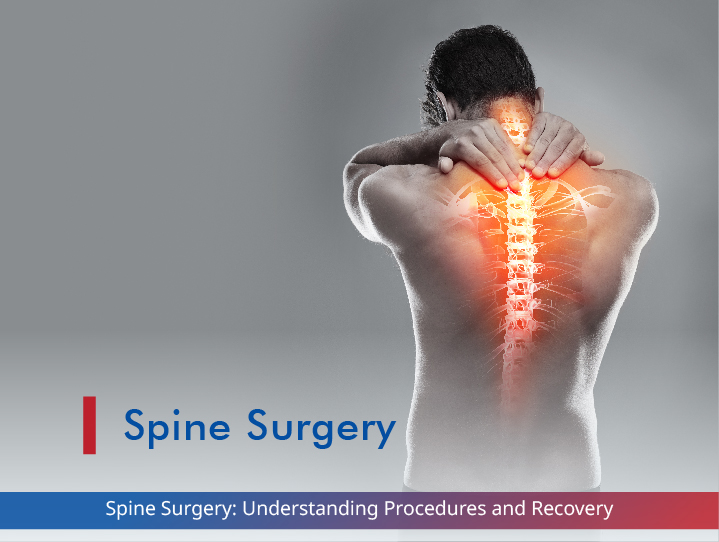The kidneys are two bean-shaped organs, located in your back on either side of your spine. Kidneys play a vital role in body function by filtering and getting rid of waste products and balancing the electrolyte levels in the body, which control blood pressure and stimulate the production of red blood cells. Sometimes, they cannot perform their normal function due to scar tissue, stone, or buildup of huge waste products. In such circumstances, the kidneys are referred to as failed. The kidney problem should be treated as soon as possible before it impacts your overall health.
What Is Kidney Failure?
Kidney failure is when your kidneys are unable to filter wastes and clean blood. Your body becomes overloaded with wastes and toxins if your kidneys do not function well. Kidney damage can cause serious complications to your health if left untreated.
Facts About Kidney Failure
- Kidney failure may not cause symptoms in some people. Symptoms usually develop after the buildup of excess waste products and fluids.
- Treating the underlying diseases may be the first step in correcting kidney abnormality.
- Chronic kidney disease can be prevented by controlling blood pressure and diabetes.
- Dialysis or kidney transplant is the only option if the kidneys are completely failed.
What Are the Causes of Kidney Failure?
Factors that cause renal failure are:
Loss of Blood Flow to the Kidneys
- Kidney failure occurs if your kidneys do not receive enough blood. A sudden loss of blood flow to the kidneys can be caused by:
- Heart attack or heart disease
- Liver failure
- A severe infection such as sepsis
- Severe burn
- Dehydration
- Allergic reaction
- High blood pressure
- Anti-inflammatory medications
Urine Elimination Problems
Your kidneys are overloaded by toxins if they cannot eliminate urine. Some cancers such as prostate cancer, colon cancer, bladder cancer, and cervical cancer can block the urine pathway.
Other conditions that interfere with urination and lead to kidney failure are: –
- Damage to the nerves that control your bladder
- Kidney stones
- Blood clots in your urinary tract
- An enlarged prostate gland
Other Causes: –
- Other factors that may increase your risk of kidney failure include:
- Scleroderma
- Blood clots in and around your kidneys
- Alcohol Consumption
- Vasculitis
- Multiple myeloma
- Uncontrolled diabetes
- Certain antibiotics
- Chemotherapy drugs
- Lupus
- Inflammation of the kidneys’ small blood vessels
- Hemolytic uremic syndrome
What Are the Symptoms of Kidney Problem?
Symptoms of early-stage renal disease may be difficult to notice, as they are often subtle. Common signs of kidney failure may include: –
- Pain or pressure in your chest
- Reduced amount of urine
- Seizures
- Swelling of your legs, feet, and ankles caused by retention of fluids as a result of kidney failure
- Persistent nausea
- Coma
- Shortness of breath
- Confusion
- Fatigue or drowsiness
- Loss of appetite
- Congestive heart failure
- High blood potassium
- Metabolic acidosis
Different Stages of Kidney Failure
Kidney failure has five stages, ranging from very mild to complete failure.
Stage 1
It is a very mild stage and you may not experience any symptoms or complications. It is manageable by maintaining a healthy lifestyle that includes a balanced diet, regular exercise, and less to no use of tobacco products. It is important to manage your blood sugar if you have diabetes.
Stage 2
It is also a mild form, but physical damage to the kidneys and protein in the urine may be obvious. This stage also requires following a healthy lifestyle. Along with that, you should discuss with your doctor about the other factors that can grow your disease further, including blood disorders, heart disease, and inflammation.
Stage 3
It is considered a moderate failure. You can experience symptoms such as back pain, frequent changes in urination, and swelling in feet and hands. Lifestyle changes may help, but your doctor may also prescribe medications to treat the underlying disease that can speed up the disease’s progress.
Stage 4
This stage is considered moderate to severe. You can experience symptoms such as bone disease, anaemia, and high blood pressure. A healthy lifestyle is important and also your doctor will recommend treatments to slow down the progress.
Stage 5
Mostly, your kidneys completely fail during stage 5. Symptoms are more obvious, which include difficulty breathing, nausea, itchy skin, chest pain, and more. You will need routine dialysis or kidney transplantation during this stage.
How Is Kidney Failure Diagnosed?
Your doctor might perform the following tests to diagnose kidney failure:
- Urine Output Measurements – This test measures how much you urinate in 24 hours. Low urine output may suggest that you may have kidney failure.
- Urinalysis – A sample of your urine is tested to check if any abnormal protein or sugar is present in your urine.
- Imaging Tests – Your doctor may perform an ultrasound, CT, or MRI scan to see the image of your kidneys and urinary tract. This allows them to see if there is any blockage or abnormalities present in your kidneys.
- Kidney Biopsy – A sample of your kidney tissue is tested to see whether your kidneys function well.
How Is Kidney Failure Treated?
Your doctor will suggest any of the following treatments depending on the severity of your condition.
Treatments to Balance the Amount of Your Blood Fluids
Your doctor may provide oral medications or fluids intravenously if your kidney failure is caused by a lack of fluids in your blood.
Medication to Restore Blood Calcium Levels
Your doctor might recommend an infusion of calcium if calcium levels in your blood are decreased.
Medications to Other Symptoms
Your doctor might prescribe medications to treat the symptoms associated with kidney failure such as swelling, anaemia, bone pain, chest pain, and more.
Dialysis
It filters and purifies the blood using a machine that performs the function of the kidneys. You will be connected to a large machine or portable catheter bag depending on the type of dialysis. Dialysis does not cure kidney failure but can extend your life if you undergo regular treatments.
Kidney Transplant
It involves surgically placing a healthy kidney into your body. Transplanted kidneys function normally, but everyone cannot be the right candidate for kidney transplantation. You should talk with your doctor to determine whether you can undergo transplantation.
Seek medical help as soon as you notice any symptoms of kidney failure.











